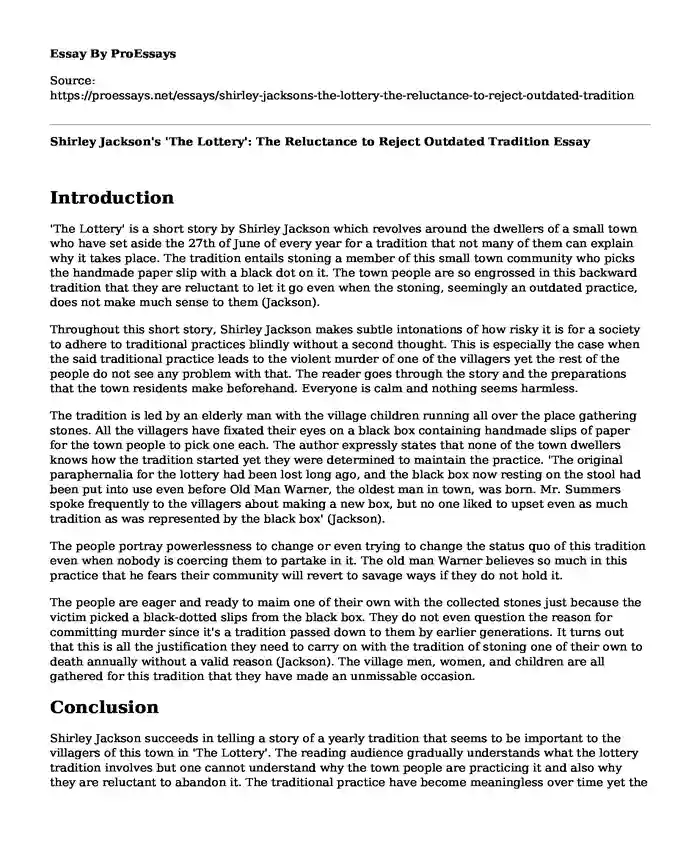Introduction
'The Lottery' is a short story by Shirley Jackson which revolves around the dwellers of a small town who have set aside the 27th of June of every year for a tradition that not many of them can explain why it takes place. The tradition entails stoning a member of this small town community who picks the handmade paper slip with a black dot on it. The town people are so engrossed in this backward tradition that they are reluctant to let it go even when the stoning, seemingly an outdated practice, does not make much sense to them (Jackson).
Throughout this short story, Shirley Jackson makes subtle intonations of how risky it is for a society to adhere to traditional practices blindly without a second thought. This is especially the case when the said traditional practice leads to the violent murder of one of the villagers yet the rest of the people do not see any problem with that. The reader goes through the story and the preparations that the town residents make beforehand. Everyone is calm and nothing seems harmless.
The tradition is led by an elderly man with the village children running all over the place gathering stones. All the villagers have fixated their eyes on a black box containing handmade slips of paper for the town people to pick one each. The author expressly states that none of the town dwellers knows how the tradition started yet they were determined to maintain the practice. 'The original paraphernalia for the lottery had been lost long ago, and the black box now resting on the stool had been put into use even before Old Man Warner, the oldest man in town, was born. Mr. Summers spoke frequently to the villagers about making a new box, but no one liked to upset even as much tradition as was represented by the black box' (Jackson).
The people portray powerlessness to change or even trying to change the status quo of this tradition even when nobody is coercing them to partake in it. The old man Warner believes so much in this practice that he fears their community will revert to savage ways if they do not hold it.
The people are eager and ready to maim one of their own with the collected stones just because the victim picked a black-dotted slips from the black box. They do not even question the reason for committing murder since it's a tradition passed down to them by earlier generations. It turns out that this is all the justification they need to carry on with the tradition of stoning one of their own to death annually without a valid reason (Jackson). The village men, women, and children are all gathered for this tradition that they have made an unmissable occasion.
Conclusion
Shirley Jackson succeeds in telling a story of a yearly tradition that seems to be important to the villagers of this town in 'The Lottery'. The reading audience gradually understands what the lottery tradition involves but one cannot understand why the town people are practicing it and also why they are reluctant to abandon it. The traditional practice have become meaningless over time yet the town residents cling to it without knowing how it came it to be. They cannot imagine themselves going against this tradition whose purpose they cannot explain.
Work Cited
Jackson, Shirley. The Lottery and Other Stories. New York: HarperPerennial Classics, 2016. Internet resource.
Cite this page
Shirley Jackson's 'The Lottery': The Reluctance to Reject Outdated Tradition. (2022, Jul 21). Retrieved from https://proessays.net/essays/shirley-jacksons-the-lottery-the-reluctance-to-reject-outdated-tradition
If you are the original author of this essay and no longer wish to have it published on the ProEssays website, please click below to request its removal:
- A Literary Essay Sample: Allusions in Hamlet
- A Literary Essay Sample: Ordinary Men Response
- Comparison of the Novels Metamorphosis and Trials Essay
- Chickamauga and Vigil Strange I Kept on the Field One Night Essay
- Albert Schweitzer Quotes Paper Example
- Reaction to "Oedipus The King" Essay Example
- Critical Essay on Jane Eyre: A Tale of Injustice & the Women's Movement







